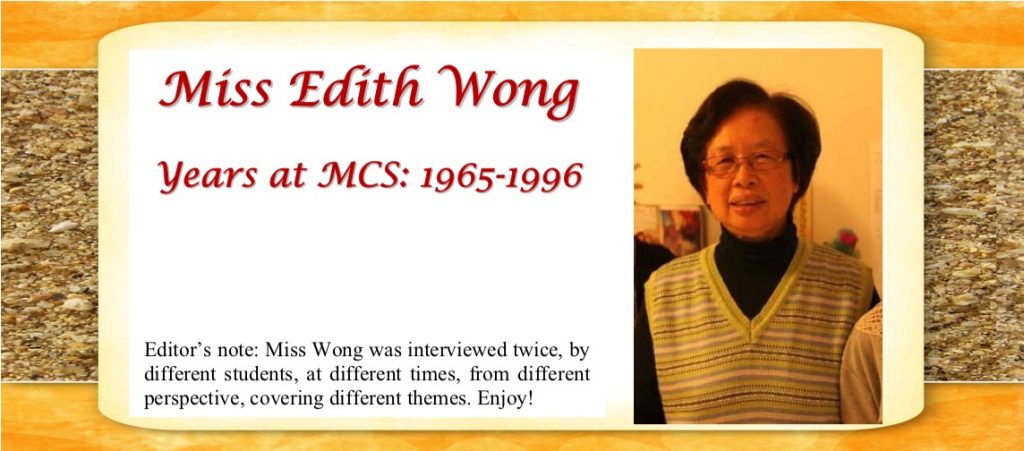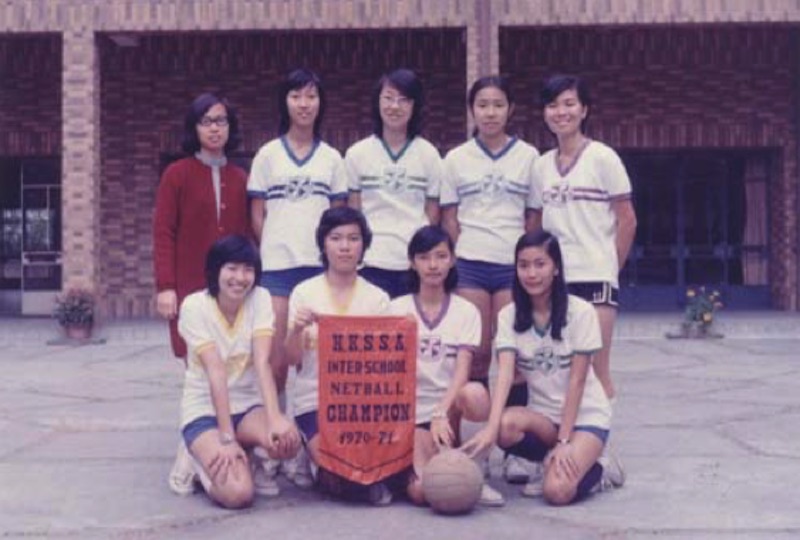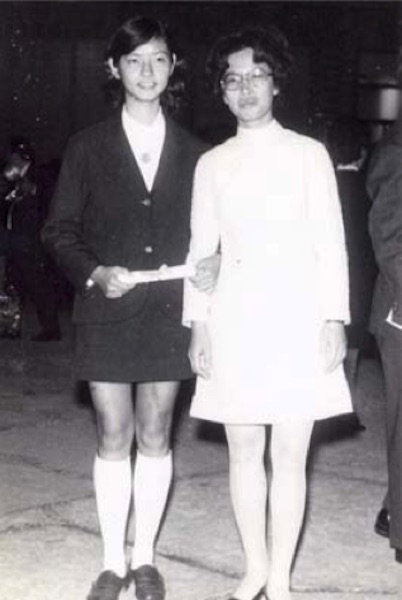
The teacher who built MCS’s P.E.
Interviewer & Writer: Olivia Aires da Silva (86’)
Synopsis: In this exclusive interview, Miss Edith Wong reveals the inside story of how Maryknoll Convent School evolved from owning just a few hula hoops in the P.E. equipment room back in the 60’s to the multi-faceted sporting clubs they have today. Her 31 years of dedication at Maryknoll proved to be more than a milestone in her life for she touched the minds and lives of many – sisters, teachers and students alike in reinforcing the intrinsic value of education.
Interviewer: “Why did you choose to teach at MCS?
Miss Wong: “When I graduated from the College of Education, I was aiming to teach at a public school but the government started its cutbacks in education and reduced the teacher-to- student ratio across the board. A steady income was much needed, so Mimi Lee, a friend of mine recommended me to Sister Rose Duchesne. I was hesitant at first and definitely very nervous being interviewed by Sister de Ricci because I was a new teacher and I never had any experience with nuns. I still remember that my favourite answer to the sisters was ‘Yes, Sister’.
Interviewer: As an educator, what was your vision or goal?
Miss Wong: When I first started teaching in 1965, P.E. was not a compulsory subject at MCS. At the time, it was taught by the wives of Englishmen in Hong Kong but only when they had spare time. The amount of exercise our girls had was random and inconsistent. While some students really enjoyed P.E., there were many who did not care for it. I wanted students to know the benefit of exercise for the development of good health and to also have some fun out of it.
Interviewer: What subjects did you teach?
Miss Wong: Over the years, the range of subjects slowly increased but at the beginning, I was hired and assigned to teach all of the classes from Form one to five P.E. In the following year, I became a homeroom teacher. Responsibilities increased and I was also in-charge of teaching forms 1 and 2 mathematics. Geography was my second field of concentration, so in time I taught that subject too. The spectrum kept expanding and I soon found myself involved in Bible Studies, Chinese History and Girl Guides. I think the “Yes, Sister” syndrome continued well into my career path. Who can turn down a respectable and benevolent person like Sister Rose Duchesne? She was the principal at the time and I worked with her for 7 years until Sister Jeanne’s arrival.
Interviewer: Can you tell us about the sports Maryknollers played back in the 60’s?
Miss Wong: You wouldn’t believe it. On the first day of school, I was led to this “closet” of sporting equipment. It was where the electricity box was. When I opened it, I had the shock of my life. No basketball, no badminton, no nets, no roll mats and not even basic colour bands. Instead, there were some hula hoops, some thick ropes that resembled the ones used to play tug-of-war with and a few softball gloves and bats. I pondered what I could possibly teach the girls with such limited equipment.
Interviewer: Then what was your blueprint for the school’s sports development?
Miss Wong: The process was long and our budget was limited. We started by buying some folding mats and more net balls. Larger pieces of equipment such as benches and the pommel horse were purchased through government tenders over the course of many years. The most popular sport at MCS was netball, an English game that I never learnt at the College of Education. I still remember that some girls were so motivated to play that they came back to school to paint the courts themselves. So, I had to give the girls all my support including having to bear the embarrassment I received for not knowing the rules while umpiring some of the games. Despite the fact that I had a challenging time coaching netball, our team consisting of members from our house teams namely Galaxy and Beavers excelled very well. We were even invited to the Inter-school Netball Invitational hosted by KGV and Island School. Our girls competed against international schools as well as St. Paul’s Convent and DGS. Another sport we played well was table-tennis. In 1972, we broke St. Paul Co-ed’s record. At badminton, we also impressed many teachers and students by almost defeating the defending champion, Clementi Secondary School (North Point) which held recurrent winning records in those days. To further promote and strengthen our sporting abilities, we decided to separate the girls into 4 “houses” so that we could have internal competitions. There were so many suggestions to the names for the houses but we eventually settled using names of gems. In the years to follow, we inaugurated the Swimming Gala, life-saving and cross-country clubs. The Athletic Meet developed subsequently. Track and field was in place along with many other sports as we accrued more equipment and broadened our scope of sports activities. We have come a long way.

Interviewer: What was the biggest challenge you encountered in teaching the girls? How did you overcome it?
Miss Wong: For me, the biggest challenge was communication in terms of language and social counseling. Everyone in the teaching field knew that high English standards prevailed in MCS. As a new teacher, I was conscious of my English language skills especially pronunciation. I often felt inadequate but as the years passed by, genuine relationships were built and barriers were overcome. Worthy of note is the opportunity I had as a homeroom teacher because it gave me auspicious chances of communication with students who struggled with motivation or family issues. As teachers, we have to be conscious of the environments that students are cultured in because these conditions can have a profound influence on their success in school. When we are able to identify these external factors especially poverty and family instability, we are more prepared in communicating and understanding our students. Without social workers, the 20 minutes of homeroom time before class really enabled me to discern at-risk students and tackle problems early.
Interviewer: How is MCS different from other local schools?
Miss Wong: MCS is just as academically strong as other local schools yet one main element that sets us apart from others is our community. Our school is very close-knit. There are so many tiers of relationships at work here and the most notable ones are between sisters and students as well as between homeroom teachers and students. The interaction and bond shared by these groups are compelling as our friendships extend well beyond the classroom. The Student Association follows the American style of democratic voting. Hence, the Student Body is elected rather than appointed. MCS believes that all students should be given a fair chance to shine regardless of their past history or record. Our assemblies are student-led because the school believes that through participation, the girls learn to organize, grow confidence and become independent. One prominent character trait of our students is independence. When I could not make it to the girls’ out-of-school competitions, they never backed down even though they had no coach to accompany them. Senior girls took up the responsibility of leading the younger ones in all respects. You can imagine the sense of pride we felt when we received a letter of praise from Island School one year commending on how well our students behaved on their own during away games.
Interviewer: What is the most unforgettable event or moment in your MCS years?
Miss Wong: It was Christmas in 1971 and I received a parcel from the U.S. When I opened it, I felt deeply moved because it was a leather bag (my very first and one that was large enough to fit all my books!) from a few old girls who have gone abroad to study. The thought of being on their minds and in their hearts made me feel truly grateful.
Interviewer: What changes have you witnessed over the course of the 31 years at MCS in terms of standards, curriculum and students?
Miss Wong: There have been quite a few changes.
- English used to be the main language of communication at school.
- The range of subjects offered is much greater than before.
- The enlargement of the school has brought about more students; hence, more complexity.
- Nuns used to be the head of the school much like the head of a family. Sister Jeanne is a perfect example of the icon of MCS.
Interviewer: If you had to choose one or two words to represent MCS, what would it/they be and why?
Miss Wong: Mission and pride. Maryknoll is a school that incorporates its mission into daily activities. Teachers and students are guided by the beliefs and values that the school embraces. By adhering to our set mission, we grow not only to become a wholesome individual but a part of something greater. Pride lies in the core of every Maryknoller’s heart. The indomitable school spirit is shared by all who have established a sense of belonging and connectedness to the school. By connecting to teachers and fellow students, Maryknollers develop a life-long bond with each other and even though they may have graduated, their sense of school pride lives on.
Miss Edith Wong is an exemplary teacher whose connective capacity facilitated versatile connection between the school and the students. We are indebted to her pioneer work in developing the various realms of sports in MCS and laying the foundation of sports enthusiasm as well as athletic excellence. Her sincerity, compassion and positive reinforcement have inspired Maryknollers over the years and unleashed the inner athletes in many of us. By adopting an open and interactive approach in the dominant educational paradigm of the 60’s, her pedagogy has made a difference in the lives of many whilst instilling school traditions and roots in us all. If home is really where the heart is, then the pulse of MCS continues to beat as strongly as ever. We look forward to many more generations of teachers like her who make our school a home away from home.
After 31 years of teaching at Maryknoll, MCS is more than family to Edith.
Writer: Benita Chick (’99)
After 31 years of teaching at Maryknoll, MCS is more than family to Edith.
It was Year 1965
Edith joined MCS in 1965. It was her first job, and also the first time for MCS to have a full-time P.E. teacher. Educated in a government school, Edith wasn’t sure if she would fit in the English speaking elite school with devout religious background, but her worries were soon nullified.
Edith built the School’s Physical Education department from scratch all by herself, but she was never short of resources. The girls helped to chase after suppliers on equipment quotations and deliveries. Seniors escorted juniors to external events so she could stay at school to train the sports teams. Hockey and netball are unconventional sports, and it was the girls who taught Edith the rules of the games. In the following 30 years, Edith and Physical Education, including her whistle, keys, and the tin can, became one of the icons of MCS, welding the family closer.
The Sisters’ lovingness knitted the teachers and staff together, and it took no for Edith to feel at home. Sister Rose Duchesne, the Principal then, helped Edith integrate with the big family by assigning her as class mistress of a F. 1 class, teaching geography in addition to her P.E. classes. The daily home room time helped developed bonding with her classes which lasted ever since.
The MCS Spirit
For Edith, the MCS spirit is the bonding and caring for family members. The MCS motto, “Sola Nobilitas Virtus” (Virtue Alone Ennobles) describes the school’s vision and mission aptly – educate for holistic, personal growth, develop potentials in all, not applauding only the elites. Exemplary of this spirit is that class rankings are never published in order to avoid singling out achievements or failures. Another example of the School’s openness and democratic inclusiveness is the election of prefects. The School never intervened with the result even if “naughty” students, often more popular among their peers than well behaved ones, are elected. The Student Association was just established when Edith joined. She was very impressed by the full responsibility that the Sisters entrusted in the girls, and the outstanding ability demonstrated by the SA, especially in organizing events such as the weekly assemblies and Halloween nights.
The School’s trust and care enchanted every student. Edith remembers that a student who left for a “better” school after studying here for 2 years only kept returning to visit as she considers MCS her real home.
Yet times have changed. Edith laments that Maryknoll girls, especially those from 70s and 80s classes, price service as important as their studies. At the same time, parents used to place complete trust with the School, allowing their daughters to stay after class and join many activities, but they now weighed more on examination results than character development. Students are being pulled in different directions, all competing for time and attention. One illustrative example is student life guards. In Edith’s earlier years, girls took great pride in being able to complete strenuous life savers certification trainings, and fight to be on duty in the sun, obliterating the swarms of mosquitoes thirsting their blood. Now there’s hardly any girl as excited about going through such training, not to mention to be on duty.
Flash Backs
Edith witnessed how a F.1 teacher displayed obvious favoritism, and that became a reminder for her throughout her career. She constantly reminds herself to be fair, caring, and appreciative of all students regardless of how they are. She believes that teachers must control their emotions and biases and reason logically with students at all times. One unintentional harsh word or gesture may totally ruin hard earned trust.
Edith is very proud of the Girl Guide unit she founded, lauding it as one of the best ways to develop diverse potentials and build solidarity. Some girls may try to avoid classes but would never fail to attend Girl Guide activities.
Edith encouraged students to participate in external competitions so they can learn from the real world, on sports and interpersonal skills. By assigning senior students to look after juniors, she trained them to assume responsibilities and be role models. These became fertile training ground to develop young leaders, team collaboration, and conflict resolution, as attested by one of her students, Wendy Au (’72).

The MCS Family
Being single, Edith has devoted all her time and attention to MCS, even more so than with her mother at home. She considers all girls at MCS her daughters, and to her immense gratification, the affection is reciprocated. More than 70 girls from various years flew in from around the world, to celebrate her birthday in Vancouver in 2011.
Edith says with pride:
“I have borne no child of my own, but I have daughters all over the world.”